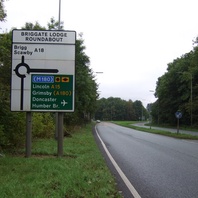
Viking Names
Scawby
Scawby, in the Manley Wapentake of Lincolnshire, likely comes from the Old Norse male personal name and byname Skalli, related to Old Norse skalli ‘a bald head, a bald-headed person’ and bý ‘a farmstead, a village’. Alternatively, skalli could be used to describe a bald hill. In the neighbouring parish of Broughton the minor names Scalehou and Scallehou were recorded in the twelfth and thirteenth century, the first element being the same Old Norse personal name with Old Norse haugr ‘mound’. Likely the Skalli of Skal(l)ehou was the same person as Skalli of Scawby.
Read More

Viking Names
Crosby
Crosby, in the Manley Wapentake of Lincolnshire, is a difficult name. The earliest spelling of the name in the Domesday Book suggests that the name comes from the Old Norse male personal name Kroppr and the Old Norse element bý ‘a farmstead, a village’. However, it is believed that this spelling is an error as it is not supported by later forms which indicate rather a place-name meaning ‘the farmstead, village marked by crosses’, from krossa, the genitive plural of Old Norse kross ‘cross’, with Old Norse bý.
Read More
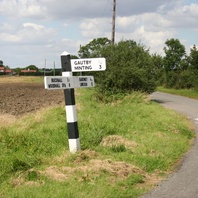
Viking Names
Gautby
Gautby, in the South Riding of Lindsey in Lincolnshire, comes from the Old Norse male personal name Gauti and Old Norse bý ‘a farmstead, a village’.
Read More
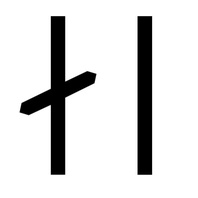
Viking Names
Eileif
The Old Norse male personal name Eiláfr/Eileifr is not always to be distinguished from another Old Norse male personal name Eilífr. This is evident in the place-name Elston, Nottinghamshire where the first element is either Eiláfr or perhaps Eilífr. Eiláfr/Eileifr is an Old Norse compound name with the first element being either Ei- ‘always’ or Ein- ‘one, alone, single’ combined with the second element -leifr/-láfr ‘inheritance’ which when used in a personal name likely has the sense of ‘son’. This name was frequently used throughout medieval Scandinavia and is attested in Danish place-names and runic inscription, Swedish runic inscriptions, and became common in Norway after 1270. The name occurs in Domesday Book, and later medieval documents, for both Lincolnshire and Yorkshire.
Read More

Viking Names
Saxulf
Saxulfr is an Old Norse compound of Sax-, from either Old Norse sax ‘short sword’ or Saxar the masculine plural of ‘Saxons’, and –ulfr ‘wolf’. The mutated form Sǫxulfr appears early in West Scandinavia, but it is not very common. It is found in one Norwegian place-name, a couple of place-names in Sweden, and a number of place-names in Denmark. Saxulfr is also likely the first element of the place-name Saxilby, Lincolnshire.
Read More

Viking Names
Aylesby
Aylesby, in the Bradley Wapentake of Lincolnshire, comes from the Old Norse male personal name Áli and bý ‘a farmstead, a village’. Áli is also the first element of Ailby, Lincolnshire, and Alby, Norfolk.
Read More
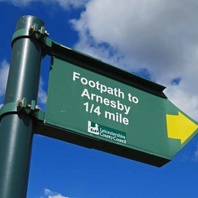
Viking Names
Arnesby
The first element of Arnesby, in the Guthlaxton Hundred of Leicestershire, is likely the Old Danish male personal name Iarund (Old Norse Iǫrundr) which might have given a Middle English form Erendes in the genitive. However, it has been argued that the specific element might be the Scandinavian appellative erendi ‘errand, message’ which may be an unrecorded byname. The second element is Old Norse by ‘a farmstead, a village’.
Read More
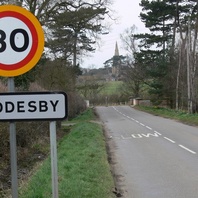
Viking Names
Gaddesby
Gaddesby, in the East Goscote Hundred of Leicestershire, is a Scandinavian compound from the Old Norse male personal name Gaddr, which is an original byname from Old Norse gaddr ‘a goad, a spur’, and Old Norse element by ‘a farmstead, a village’. Alternatively it has been suggested that the first element is Modern English gaddr transferred topographically to the ‘spur of land’ on which the settlement is located. However, it is difficult to conceive the escarpment in which the village sits on as a hill-spur.
Read More
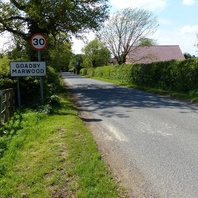
Viking Names
Goadby Marwood
The first element of Goadby Marwood, in the Framland Hundred of Leicestershire, comes from the Old Norse male personal name Gauti (genitive singular Gauta), which is either a short form of names in Gaut- or is derived from an original byname meaning ‘a man from Gautland’. The second element of the place-name is the Old Norse element by ‘a farmstead, a village’. The affix Marwood is the family name of Gaufridus Maureward who held the manor in 1247. The manor remained in the family until at least 1428. The affix Marwood distinguishes the township from Goadby, in the Gartree Hundred of Leicestershire.
Read More
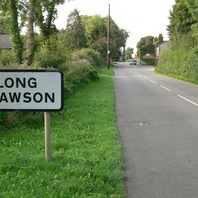
Viking Names
Long Clawson
Long Clawson, in the Framland Hundred of Leicestershire, likely comes from the Old Danish male personal name Klak (Old Norse Klakkr), an original byname probably meaning ‘a lump, a clod’. This personal name is frequently found throughout the Danelaw and occurs in other place-names such as Claxby, Lincolnshire, and Claxton, North Yorkshire. Alternatively, the first element has been suggested to be Old English clacc ‘a hill, a peak’. The second element is Old English tun ‘an enclosure; a farmstead; a village; an estate’. The village is variously described as in the Vale referring to the Vale of Belvoir, and since c. 155o the affix had been Long from Old English lang ‘long’ likely because the township is of linear formation and is approximately one mile in length.
Read More
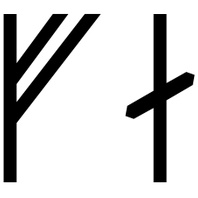
Viking Names
Thorfast
Þorfastr is a common male name in the eastern part of the Viking world – it is common in Swedish runic inscriptions and is even found in the inscription on a rune-stone fragment found in Finland, as well as a couple of Danish ones, but it does not occur in any Norwegian or Icelandic texts. It can be found in the runic inscription on the Lincoln comb-case.
